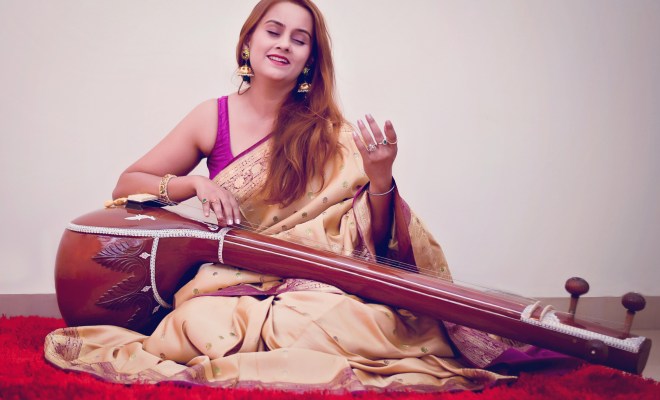Rajkumari Sharma Tankha
Runki Goswami is both, a singer and a music composer. Apart from doing live concerts and giving music to films down South, she also has albums like Manmarzian, Odhi Chunar Dhaani (both in Hindi) and devotional album Debobeena (in Bengali) to her credit.
Recently (September 27) she performed at India Habitat Centre, New Delhi, paying rich tributes to the legendary music composer Salil Chowdhury wherein she sang his famous songs like Na jane kyun hota hain yeh Jindagi and Janeman janeman tere do nayan much to the delight of the audience.
Following is a tete-a-tete with the singer…
Your family background…..
My entire family is into music. I learned music from my grandparents. Then I also took music lessons from my dad. My father plays violin, Tabla and all. I started learning Hindustani Classical Music when I was three years of age. I was exposed to stage performances at the age of six.
You always wanted to be a musician?
I was naturally brought into music. I have been keenly following music since childhood . I give performances on stage, I have performed on radio, in person and all. I am the only one in the family who has taken it professionally.
Who do you consider your first guru?
My early music influence was my grandmother’s renditions of various classical ragas followed by my dad’s violin recitals. Hindustani classical music was a part of my upbringing and I grew up listening to Girija Devi, Kishori Amonkar, Parveen Sultana, Pt Jasraj etc.
If you were to compare Hindi cinema with the film industry down South, what would you have to say?
The music down south has a different flavor. It has a regional feel and a very common mass flavor. Most of the songs sound similar due to this and therefore the overall shelf life of south Indian film music is less. Again, there are exceptions and some songs still rule the charts.
As against that, Hindi cinema is far more experimental and worldwide accepted that music of films down south.
What, according to you, is best thing about Hindi cinema?
Hindi cinema has always influenced regional music and regional music has also influenced Hindi cinema. It’s like a two-way approach. Hindi cinema contributes and brings a lot of awareness about regional folk music. Bollywood makes us aware that this kind of songs is from which region, that kind of song is from pahadi region.
Why did you choose regional cinema over Hindi cinema? Is it due to the creative freedom filmmakers in South India give to the composers?
Nothing like that. I was composing music for Bengali albums and it was through them that film director M. Balu came across my music. It was all destiny that I met with M. Balu and got a chance to work.
How difficult or easy is it to compose music in a language you have never learnt?
I have been learning music since my childhood days so it is pretty easy for me to sing in another language.
Any plans to move to Hindi cinema or are you satisfied composing music down South?
I am composing music in south but if I get any chance in Hindi Cinema then I will think about it.
Your favourite music directors in Hindi cinema (past and present)
A R Rahman
If not a musician, what would you have been?
I have never thought about it but what I feel is I am attached to music since my childhood days. Music is something which I have got from my family as a gift and I am lucky enough that I took it to a professional way.
